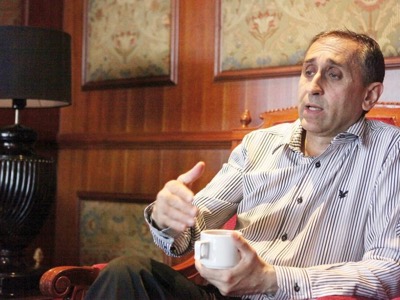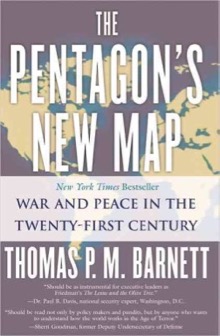The Pentagon has its eyes on Venezuela
The recent events of violence that took place in Venezuela, driven by radical, right wing groups, have got sociologists, political scientists, journalists and national and international intellectuals talking.
Thierry Meyssan, a journalist, researcher and expert in geopolitics, warned that these acts form part of a strategy, designed by the US Government, to provide the basis for a military intervention; an intervention similar to what took place in countries in the Middle East and North Africa and the product of campaigns seeking to set up people against people and people against governments; events which have come to be known as the Arab Spring.
VOLTAIRE NETWORK | CARACAS (VENEZUELA) 

- Thierry Meyssan
—What exactly does the United States want from our country?
— The United States is seeking to generate here in your country a civil war of the genre it launched at the beginning of this decade in some countries in North Africa and the Middle East – the so-called Arab Spring, where they pitched in combat brothers against brothers to weaken the region’s governments by funding highly radicalized terrorist groups that we are witnessing right now sowing terror.
— How do you think that this strategy is going to function?
— Even though it is not clear what groups from here are supporting the United States achieving its goal, I take note that it has several military bases in a neighbouring country. Thus clearly danger is in the making. For starters, the US is going to carve up the population by trying to radicalize it.
— How do you think it is going to bring about this division?
— First, the US will try to convince the Venezuelans that this government will first be displaced and then replaced by another government. The idea is that the people will lose confidence in the government and public institutions. Once this seed has been planted in their minds, the hope is that people will be convinced that History’s writing is on the wall and that there is nothing they can do about it. This would be similar to what has taken place in the Arab countries; of course, the only people to have survived threats of this type are precisely those that have remained united. In the case of Venezuela, it is worth emphasizing that the Commander Hugo Chavez scattered the seeds of nationalism throughout the country and the germination of such seeds is important to tackle the situation before us.
— But why exactly does this Northern country want this?
— Let me take you back to 2001: after the Twin Towers collapsed and the Pentagon was attacked, there was no objection to the US flouting all fundamental rights; it was then it began to start attacking each one of the Near East states; the next step will be Latin America. From the beginning of the nineties, following the dissolution of the Soviet Union, the United States set itself up as the incontrovertible world power. By this time, it was already conscious of what it had to do in order to achieve this; if it was necessary, it had to lose many things. If it had to lose both its arms, it would be ready to do it.
— What would be the role of the mass media in this plan and how should we compare its information policy with that employed in conflicts in the Arab states?
— For us, these demonstrations that have taken place in Venezuela have been evidently covered by international media to present an image which is very different from what is actually occurring. As for what occurred yesterday (Monday) on the motorway (Francisco Fajardo), it was magnified to show that war has erupted in Venezuela and that opposition is no “David”. The truth is that I saw for myself this demonstration and noted just how poor turnout actually was. Also the impression the media had wanted to give to the Western World is that people are dying of hunger in Venezuela simply because the government is not giving them anything to eat.
— What opinion do you have on the press coverage on the harassment and aggressions, in one form or another, chiefly in the United States and in some European countries, of persons that support the Bolivarian Revolution and its President?
— The question that must be posed is why the media is lying? It is illogical, and senseless; yet clearly, the response must be that these media form part of the military policy the US is pursuing to establish a basis for war (ius ad bellum). In the Pentagon’s command room there are military groups that are not there to see what is actually going on but simply to plan together; for example, with people from Reuters Agency and of course they rely on the participation of a pool or group of international media. With all these elements, it is claimed to create a negative image of some Government officers by charging them of being drug traffickers or being involved in crimes of corruption or assassinating their own people. To implement this plan, it is necessary to fund and form groups for terrorist actions to attack public institutions and to create an inverse effect. The one exception is the television channel, Telesur, which presents facts as they are.
Of course, to reach this goal, a plan has also been drawn up to slow down communications between Venezuela and the rest of the world. I have spent four days in Venezuela and it has been very difficult for me to communicate by telephone. I had to have recourse to applications like “whats app”, for example, applications which are under US control.
— What is going to happen to countries classified as US allies but which also have affinity to us because they are part of Latin America?
— It is unclear if this attack will be strictly limited to the countries of “North East” South America (Venezuela, Bolivia, Ecuador), or directed against the Latin America in its entirety; but, if we go by documents declassified in 2004 by the Pentagon, it is not anticipated that it will strike any of the following: Argentina, Mexico and Brazil. We must keep in mind that from 2004 to now, many things have happened in Brazil and Mexico, because of which the US strategy could have changed.
— What perception do you have of Venezuela following your four day stay?
— I believe that the Venezuelan people are really motivated to preserve their gains. To the extent that the people are gaining confidence in the country, of course, Venezuela is doing well. Also, it is very important that the Venezuelans seek alternative means, different to the US allies, to be able to provide information on what is actually happening. They could use VoltaireNet for example as such a vehicle.
Translation
Anoosha Boralessa
Anoosha Boralessa










No comments:
Post a Comment